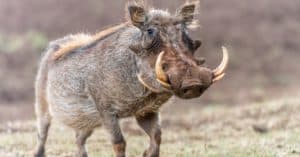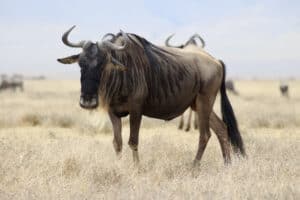Bison, also known as buffalo, hold a special place in the American consciousness. These enormous and impressive animals once roamed the plains in large herds. They were prized by numerous Native American tribes and made their way into settler lore. These days, bison herds often get raised as a source of delicious meat. The tasty treat has gained popularity recently due to its unique flavor, lean profile, and potential health benefits. If you’re curious about incorporating bison meat into your diet, here are some of the important health benefits to consider.
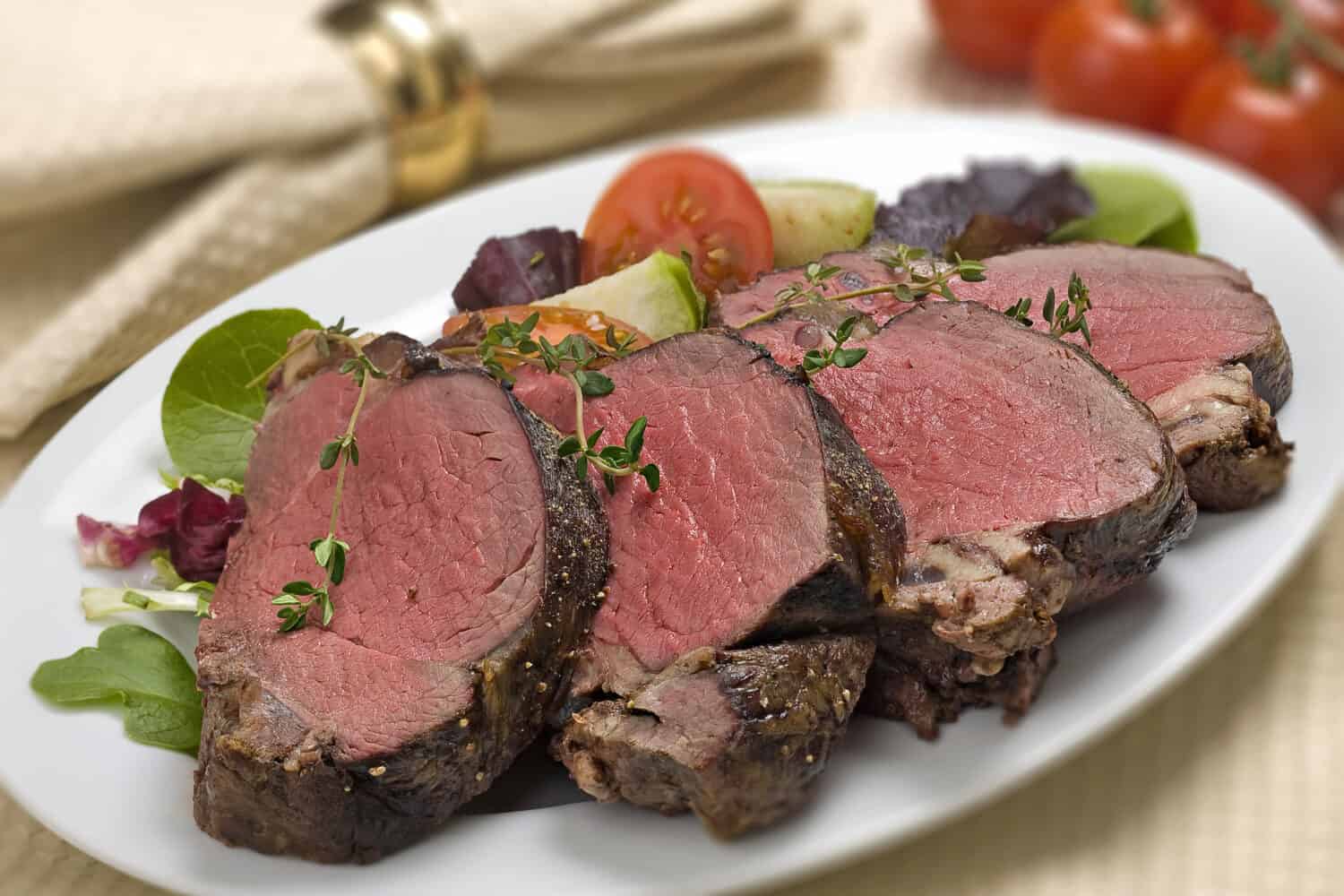
Bison meat makes a flavorful (and beautiful) addition to any plate. Plus, it packs a serious nutritional punch.
©ARSTI/Shutterstock.com
High in Protein
Bison meat is a rich source of high-quality protein. These essential amino acids are necessary for muscle growth and repair. It contains approximately 20 grams of protein per 100 grams. Bison meat is also a complete protein source. It has all 20 essential amino acids.
Lean and Low in Fat
In contrast to its high protein content, bison is relatively low in fat. A 100-gram serving of bison meat has only 7 grams of fat and 146 calories. These numbers are significantly lower than those found in a comparable portion of beef (85% of lean ground beef has 15 grams of fat). It is an ideal solution for those looking to decrease their overall fat or caloric consumption.
Omega-3 Fatty Acids
Bison meat is a good source of heart-healthy omega-3 fatty acids. These fatty acids are essential for brain function, reducing inflammation, and supporting cardiovascular health.
Rich in Iron
Bison meat is an excellent source of iron. We need this vital mineral to help facilitate oxygen transport, energy production, and overall vitality. Iron deficiency can lead to fatigue, weakness, and impaired immune function. So bison meat is a valuable addition to a balanced diet. One 113-gram serving contains 13% of the recommended daily value (DV).
Excellent Source of Vitamin B12
Vitamin B12 is critical for the formation of red blood cells, DNA synthesis, and optimal neurological function. Adequate intake of B12 is essential for maintaining healthy nerve cells and preventing conditions like pernicious anemia. Thankfully, a 113-gram serving of bison meat provides approximately 68% of the DV of vitamin B12.
The same serving size also boasts 28% of the DV of B3 (niacin) and 19% of B6.
High in Zinc
Bison meat contains surprisingly high levels of zinc. This essential mineral supports immune function, wound healing, and DNA synthesis. It also helps us maintain a healthy immune system. One single 113-gram serving contains 35% of the DV for zinc.
Source of Selenium
We don’t often hear about selenium when nutritional conversations arrive. But this nutrient plays a vital role in our overall health. Selenium is an antioxidant that fights the free radicals that bring disease. The good news is that you can get much of your DV with just one bison serving (113 grams). That portion has a whopping 31% of your DV.
Lower in Sodium
Bison meat is naturally lower in sodium than other meats. So it is an excellent choice for individuals watching their sodium intake. There are roughly 45 grams of sodium per serving of bison meat.
Grass-Fed and Free-Range
Most bison herds are grass-fed and free-range. This balance results in meat that is lower in unhealthy fats and higher in beneficial nutrients. Two of those are omega-3 fatty acids and conjugated linoleic acid (CLA). Regular intake of these key nutrients has numerous health benefits, including reduced inflammation, improved heart health, and enhanced weight management.
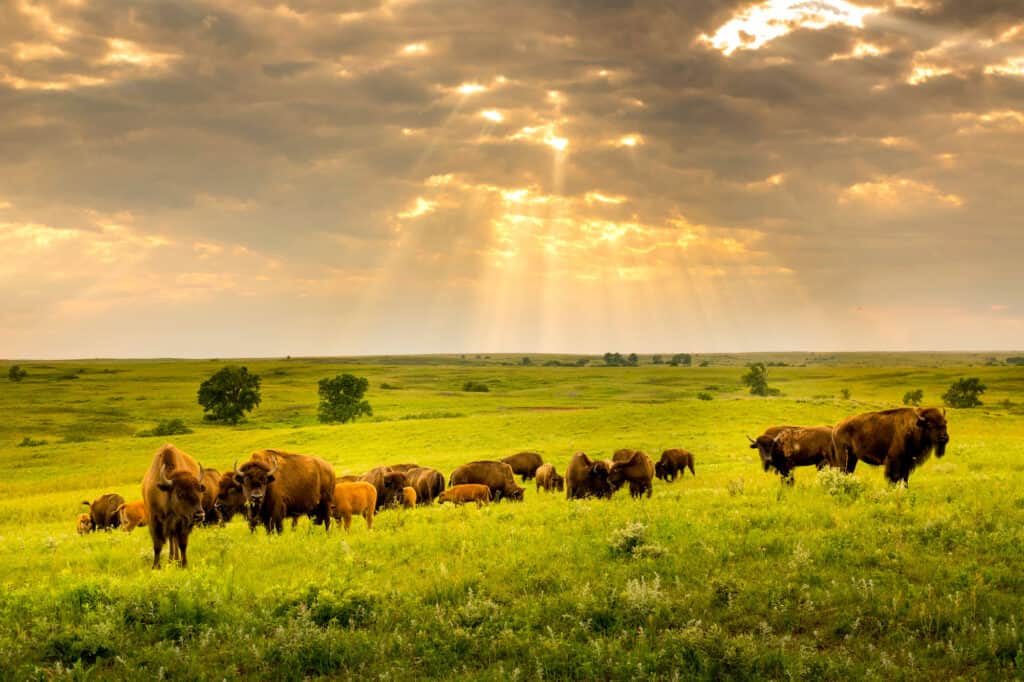
Most bison herds are grass-fed and free-range.
©Ricardo Reitmeyer/Shutterstock.com
Suitable for Paleo and Keto Diets
Bison meat aligns well with paleo and keto diets due to its high nutrient density. It contains zero carbs, making it an ideal choice for those following a low-carb lifestyle. The nutrient-packed nature of bison meat ensures you get the essential nutrients without compromising your dietary goals.
Allergen Friendly
It may come as a surprise to learn that some people have a meat allergy. Typically, that is to items like beef, pork, and sometimes chicken. But wildgame does not appear to impact these individuals in the same negative fashion. Since bison herds are raised in a natural setting and often processed in different facilities, many individuals with meat allergies can tolerate bison.
Flavorful and Versatile
Bison meat has a rich, slightly sweet flavor frequently described as a cross between beef and venison. It is as versatile as other red meats. So you can typically find steaks, roasts, ground meat, and sausages.
Additionally, it can easily become a substitute for other meats in nearly every recipe. The only caveat is that if a recipe requires a cut with high-fat content, you will need to add fat to compensate.
Ethical and Sustainable
Bison is a solid ethical choice for conscious consumers. They get raised on open pastures and are allowed to graze freely. The goal is to mimic their natural habitat as much as possible. So, the herds move as they eat and don’t overgraze an area. Additionally, they often take grass seeds with them, depositing the seeds as they move.
Antibiotic and Hormone-Free
Bison are raised without the use of antibiotics or hormones. That makes it a healthier choice for consumers concerned about these substances.
Lower Risk of Disease
The nature of cattle ranching and large-scale beef production opens the door for serious diseases. But the risk of problems associated with conventional livestock farming is significantly lower in bison. They are less likely to be exposed to contaminated feeds or develop the same health issues commonly found in intensively farmed animals.
Despite that, bison are not entirely immune to diseases. They can get a disease called brucellosis. It is primarily transmittable to humans through undercooked or raw meat. Wildlife officials strongly urge that all wild game gets cooked thoroughly.
Environmentally Friendly
Bison farming has a lower environmental impact than large-scale beef production. These magnificent animals require less land, water, and resources. They have adapted to graze on native grasses and can thrive in even the harshest climates. Their grazing habits contribute to maintaining healthy grasslands, enhancing biodiversity, and minimizing the need for extensive agricultural infrastructure.
Supports Local Ranchers
Many bison herds are managed on a much smaller scale than cattle ranches. So choosing bison meat may support your local ranchers and small-scale farming communities. Some of these operations are family-owned. Buying from these producers helps sustain rural communities and traditional farming practices.
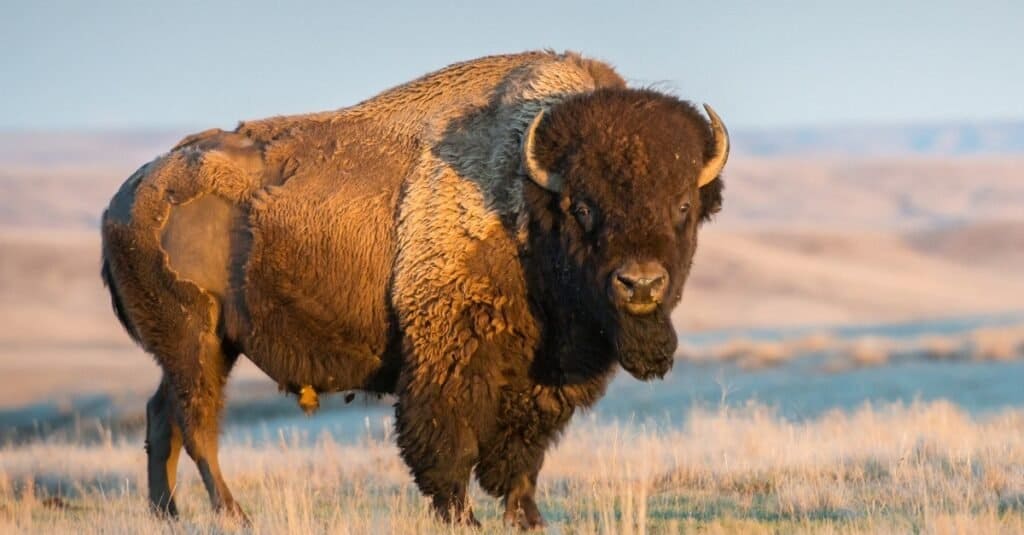
Many bison herds get managed on a smaller, local scale. Not only are these operations ecologically sustainable, but they also help promote and maintain local ranchers.
©iStock.com/Jillian Cooper
Widely Available
While bison meat was once considered a niche product, it is now more readily available in many grocery stores, warehouse stores, farmers’ markets, and online retailers. The growing demand for bison meat has made it easier for consumers to access this delicious meat.
Summary of Bison Meat Health Benefits
| High in Protein |
| Lean and Low in Fat |
| Omega-3 Fatty Acids |
| Rich in Iron |
| Excellent Source of Vitamin B12 |
| High in Zinc |
| Source of Selenium |
| Lower in Sodium |
| Grass-Fed and Free-Range |
| Suitable for Paleo and Keto Diets |
| Allergen Friendly |
| Flavorful and Versatile |
| Ethical and Sustainable |
| Antibiotic and Hormone-Free |
| Lower Risk of Disease |
| Environmentally Friendly |
| Supports Local Ranchers |
| Widely Available |
Thank you for reading! Have some feedback for us? Contact the AZ Animals editorial team.




